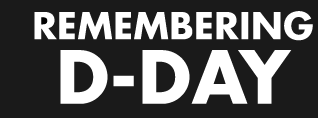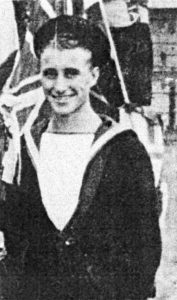My ship HMS Swift sailed down from Greenock gathering ships from practically every little harbour, creek, inlet and wherever. It was about 2200 hours on 5 June as my memory serves me that the Skipper told us exactly what was happening. There were plenty of buzzes going round the ship anyway, but then we knew officially and we turned off towards France.
We were all closed up to action stations, just waiting, then suddenly just before dawn it seemed that the heavens had erupted with the flashes and the crack of guns from the ships and bombs from the aircraft. As the minesweepers led us in towards the coast, the sea all around was black with ships and landing craft. We felt very sorry for the soldiers. It was rough out there and I think most of them must have been very sick. Then they hit the shore and poured out and up the beach – well, some of them. It was a sight we will never see again – not that anyone will ever want to.
Our job was to be at the beach just behind the minesweepers and make for a point just opposite Caen. We had an army liaison officer on board and we could lay down fire as directed by him with our 4.7s. Our luck held when an exploding enemy shell shook us from stem to stern, but when the smoke cleared only a couple of men had been hurt and light damage caused.
The next thing that happened was a huge bang off our starboard side. It was our sister ship, the Norwegian-manned HMNS Svenner. She had been hit by one or maybe two torpedoes fired by German E-Boats that had come out from Ouistreham. Although we were not supposed to stop, we did and it was a case of all hands to pull survivors out of the water. We lowered the scrambling nets over the side and I went down one to the water’s edge to grab whoever I could. I pulled a few out and helped them up to shipmates on the upper deck. Then I had hold of one poor bloke who I could see had had his legs blown away. He could not help himself very much and, as I found myself gradually getting lower in the water, I realised we were getting under way. Our skipper had orders to move and I could not hang on to this chap against the force of the water, so I had to let go. He let out a yell but was gone.
Another incident, this time an amusing one. During a small break in the action, it was our job to feed the forward half of the ship with whatever we could find. We opened tins of pineapple rings and someone – I think it was a PO – gave me a cooking pot full and told me to do the bridge. Off I went, telling everyone on the way up just to have two rings. No time for spoons or tools of any sort, just dip your fingers in. I got to the Skipper last. He looked at me and said, ‘How do I get them out?’ I looked at him with a straight face (I think) and said, ‘The same as everyone else, sir, dig your fingers in.’ He looked a bit amazed but did it and got two pineapple rings out. I said, ‘That’s alright – everyone has greasy fingers.’ Then I moved off – fast. We have talked about this since and laughed about it.
On D+18 (24 June) our luck ran out. I had a towel round my neck and was heading for the washroom when we struck a mine. There was a mighty explosion but more than just a bang. The whole destroyer seemed to shudder. I’ll always remember a voice saying simply, ‘We’ve been hit.’ I was blown up in the air and landed at the bottom of a ladder, winded. I shouted, ‘Don’t panic!’ Since I was between the men and the ladder, that was very much in my interest. Fortunately there was no panic at all. I remember the Skipper shouting out, ‘Don’t abandon ship – the water’s cold!’ That calmed everybody down. I was about to go over the side when I realised I’d put my lifejacket on an injured yeoman of signals who’d been blown from the bridge. I went back into the mess to grab anything that would float and went over the side, even though I can’t swim. I’m a bit of a fatalist and somehow I knew it wasn’t my day to die. A current washed me back under the Swift’s screws but I eventually got to a Marine landing craft 300 yards away. I was just about finished and couldn’t catch the rope at first. A Marine threw it to me again and I grabbed it. I can tell you, there was no way I was going to let go of that rope. We were given some tea and rum and whatever clothes the Marines could find for us and then taken to a merchantman manned by Indians which had been set aside to take on survivors. There we had another rum ration. The navy didn’t seem to be keeping count so we all went round several times and ended up quite drunk.
Within three days I was back in my home town of Newport in South Wales, having been re-kitted at a naval base and sent on leave. I got to Newport quite early. My sister was living in Commercial Road. My brother-in-law went to make me some tea but by the time he came back with it I was fast asleep. I had been sunk, rescued, taken back to England and was home in Newport. It was my twentieth birthday, a birthday I shall always remember.

